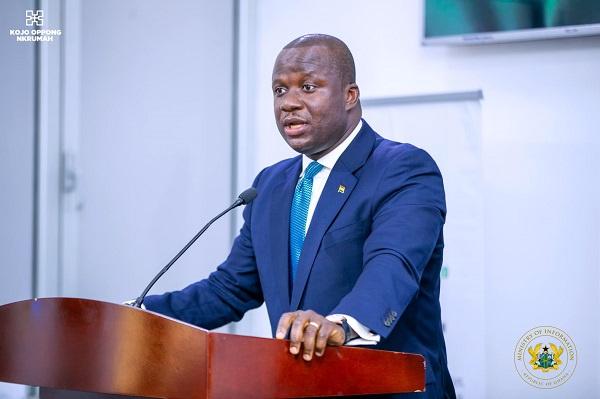The Lands and Natural Resources Minister, Samuel Abu Jinapor, has attributed Ghana’s position as the leading producer of gold in Africa to policies and programmes implemented by the government.
In a statement, Mr. Jinapor said the active intervention by President Akufo-Addo’s government in the Obuasi and Bibiani mines have triggered full scale operations of the two mines.
“It would be recalled that following the active intervention by the President, the Anglogold Ashanti Obuasi mine, which was put under the care and maintenance in 2016 was revived in 2019. The Bibiani mine had been dormant for 7 years was also revived in October 2022”.
“The revival of these two mines, the output by existing mines and the reduction of the withholding tax rate on unprocessed gold by small-scale miners which was introduced in 2015, from 3% to 1.5% have contributed significantly to Ghana’s new position on the continent”, the statement added.
Data from the Ministry indicates that gold production by large-scale mining companies increased from 2.72 ounces in 2021 to 3.08 ounces in 2022, whilst gold exports from the small-scale sector rose from 98,001 ounces to 655,656 ounces over the same period.
Overall, the country’s gold output increased from 2.82 million ounces in 2021 to 3.74 million ounces in 2022.
In 2022, the Anglogold Obuasi mine increased its gold production 132% from the previous year, whilst the Bibiani Mine which had not produced gold in last seven years, contributed 52,000oz to the country’s gold output.
Gold export from the small-scale sector also increased by nearly 570% in 2022, as compared to the previous year.
The statement continued that in the next two years, gold production in Ghana is expected to increase exponentially, with the coming on-stream of three new large-scale mining operations, namely, Cardinal Resource Namdini in the Upper East Region, Azumah Resources in the Upper West Region and Newmont Ahafo North in the Ahafo.


It added that gold continues to be the bulwark of the Ghanaian economy contributing some $6.6 billion in export receipts last year.
To this end, Mr. Jinapor said government remains committed to increasing the contribution of the mining industry to the local economy through local content and local participation as well as value-addition to minerals mined.
He pointed out that the innovative Gold for Oil policy will ensure that Ghana leverage’s its gold resources through a much more competitive trade as well as stabilize the currency while delivering cheap oil for citizens.
In addition, “Government is grateful to the Chamber of Mines for their collaborations and partnerships in achieving this feat”, he added.
Latest Stories
-
NIA workers declares strike action over withheld allowances
1 minute -
Rehoboth Properties responds to allegations of power theft at Kweiman Estate
14 minutes -
Your social media activity can affect your student visa application – U.S. Consul General
21 minutes -
GJA elections committee chairman reaffirms commitment to credible polls
1 hour -
Visa denial is not deliberate; adhere to the rules – U.S Consul General
1 hour -
Part of Accra Sports Stadium still closed as NSA lacks funds for repairs
1 hour -
Haruna Mohammed calls for amendment of political parties act to enable financial independence
1 hour -
Stakeholders advocate professional development for teachers in the standards-based curriculum
2 hours -
Sheffield United invited entire Shooting Stars team for trials because of me – Rashid Fuseini
2 hours -
Do not apply for visa through agents; they are liars – U.S. Consul General
2 hours -
Quash order to restore Nii Adama Latse II – Nii Tackie Tsuru urges Supreme Court
2 hours -
Ghana Maritime Authority executes second successful offshore medical evacuation in months
2 hours -
Bond market: Turnover increased by 13.17% to GH¢1.33bn
2 hours -
Israel says Iran violates ceasefire, orders strikes on Tehran
2 hours -
Hearts of Oak reassign Ouattara as Special Advisor after hiring Didi Dramani Head Coach
2 hours

